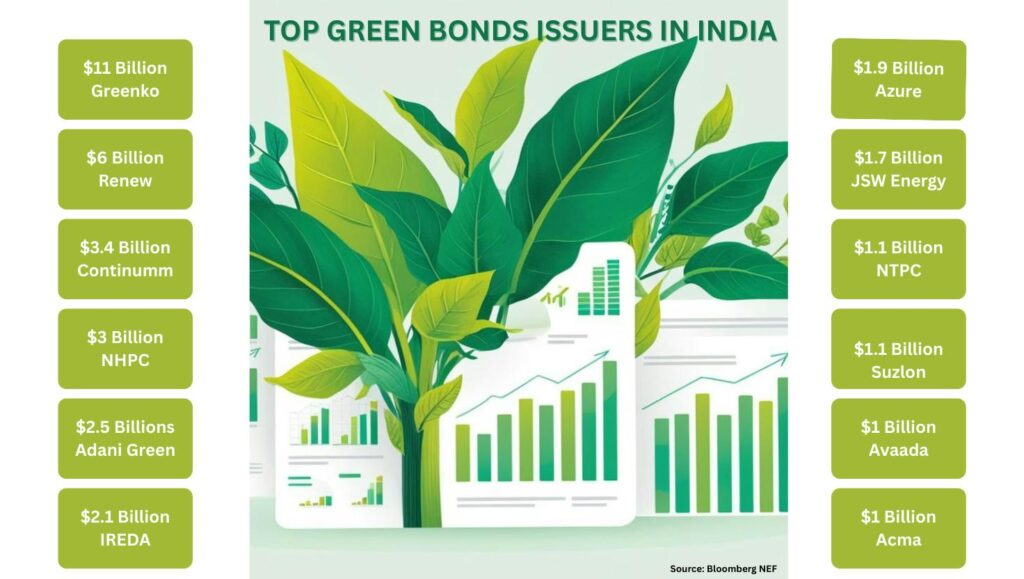
Introduction
Green bonds are debt instruments issued to raise funds for environmentally friendly projects. They function similarly to traditional bonds but with the key difference that they play a vital role in channeling funds into projects that contribute directly to India's sustainability goals. This includes projects like solar and wind energy, waste management, and clean water supply, which are critical to India's sustainability goals. Green bonds have become a vital component of India's financial landscape, offering a unique opportunity for investors to contribute to sustainable development while earning returns.
The Indian government has been proactive in promoting green bonds. In 2015, it launched the Green Bond Scheme, offering tax incentives to companies issuing green bonds. Additionally, the government has set up funds like the Green Bond Fund and the Green Infrastructure Fund to support green projects .
As India continues to navigate its energy transition and address climate change, the role of green bonds is expected to grow, supporting the nation's commitment to a greener future. The future of green bonds in India looks promising, with the private sector playing a significant role in issuances.

Sovereign Green Bonds
Earlier, only Indian residents were allowed to invest in green bonds. However, the Reserve Bank of India (RBI), through a circular (RBI/2023-24/81), has allowed non-resident Indians (NRIs) to invest in the government’s Sovereign Green Bonds issued for 2023-24. This introduction increases the pool of potential investors. A wider investor base could also improve the liquidity of green bonds, making them more attractive for both foreign and domestic investors.
In 2023, India issued its first sovereign green bonds to mobilize resources for green infrastructure in January and February 2023, worth INR 160 billion. These bonds are part of the government's strategy to reduce carbon intensity and expand renewable energy production. The proceeds from these bonds are allocated to public sector projects that support climate resilience and sustainable development goals . GoI came out with a SGrB Framework aligned with the Green Bond Principles laid down by International Capital Market Association (ICMA) . Subsequently, the SGrBs were auctioned by RBI in various tranches starting from January 2023. Details of the issuances are given below.

Additionally, as per the RBI’s issuance calendar for marketable dated securities for October 2024 – March 2025, RBI is going to auction around INR 20, 000 Cr of SGrBs in the current financial year 2024-25 through four SGrB issuances (two of 10-years tenor and two of 30-years tenor) of Rs 5,000 crore each .
Categories Of Green Bonds
According to the SEBI Circular on green debt securities dated 30th May 2017, debt security will be termed as green if the raised funds are utilized towards the following categories:
-
Renewable and sustainable energy include wind, solar, bioenergy, and other sources of energy that use clean technology.
-
Clean transportation, including mass/public transportation, etc.
-
Sustainable water management, including clean and drinking water, water recycling, etc.
-
Climate change adaptation.
-
Energy efficiency, including efficient and green buildings, etc.
-
Sustainable waste management, including recycling, waste to energy, efficient disposal of wastage, etc.
-
Sustainable land use, including sustainable forestry and agriculture, afforestation, etc.
-
Biodiversity conservation and any other category may be notified by the SEBI.
Further, as per SEBI Regulation dated 02 February 2023, green bonds are categorized into the following two sub-categories:
1. Blue bonds associated with the marine sector and water management
2. Yellow bonds related to solar energy
Key Features of Green Bonds in GIFT City
GIFT City, located in Gujarat, India, has emerged as a pivotal hub for green finance, particularly through the issuance of green bonds. These financial instruments are designed to fund projects that contribute positively to the environment, such as renewable energy, energy efficiency, and sustainable infrastructure.
GIFT City serves as more than just a financial hub; it embodies India's commitment to sustainable development and addressing climate change challenges. The government has introduced various regulations and incentives to support the issuance of green bonds, making it easier for companies to enter this market. As of mid-2023, around 30% of the bonds issued in GIFT City were green bonds, reflecting the area's focus on sustainability and growth .
• Volume and Impact: GIFT City has seen significant growth in green bonds, with over $14 billion issued under the green bond framework as of 2024 . This substantial investment underscores the city's role in driving India's green economy.
• Regulatory Framework: The regulatory environment in GIFT City, supported by bodies like SEBI and IFSCA, fosters transparency and sustainability. Guidelines for green bonds, ESG reporting, and sustainable investment practices are in place to ensure that projects meet global benchmarks for sustainability.
• International Collaboration: GIFT City aligns with international green finance standards, such as the ASEAN Taxonomy and the Climate Bonds Initiative. This alignment creates a conducive environment for international collaboration, attracting global capital into sectors critical for achieving climate goals.
• Innovative Financial Instruments: Beyond green bonds, GIFT City also supports sustainable investment funds, climate financing, and carbon trading. These instruments are crucial in promoting green banking and supporting carbon reduction efforts.
Regulatory Support for Green Bond Issuances in GIFT City
The regulatory environment in GIFT City plays a crucial role in supporting green bond issuances through several key measures:
1. Tax Incentives
• Tax Exemptions: GIFT City offers a 100% tax exemption for 10 years and lower withholding taxes on offshore bonds, making it an attractive location for issuers to raise capital through green bonds.
• Reduced Compliance Costs: Waiving fund filing fees for the first 10 ESG funds registered in the city further reduces costs for issuers .
2. Regulatory Framework
• SEBI and IFSCA Oversight: Both SEBI and IFSCA ensure that regulations align with global environmental standards, fostering transparency and accountability in green bond issuances.
• Green Finance Guidelines: IFSCA has established guidelines for green finance, including frameworks for the disclosure and listing of green bonds, which helps maintain credibility and prevent greenwashing.
3. Mandatory Green Allocation
• Green Lending Mandate: Banks operating in GIFT City are required to allocate at least 5% of their portfolios to green projects, ensuring a steady flow of capital into sustainable sectors.
4. International Collaboration
• Alignment with Global Standards: GIFT City aligns with international frameworks like the ASEAN Taxonomy and the Climate Bonds Initiative, enhancing its credibility and attracting global investors.
5. Sovereign Green Bond Trading
• RBI Framework: The RBI is developing a framework to enable the trading of sovereign green bonds in GIFT City, which will further boost the market for green bonds .
6. Transition Finance Framework
• Support for Transition Bonds: IFSCA is working on a transition finance framework to support issuers transitioning to greener operations, which will expand the scope of green finance in GIFT City.
7. Infrastructure and Market Access
• Access to Global Markets: GIFT City provides access to global investors and markets, facilitating the issuance and trading of green bonds.
Overall, the regulatory environment in GIFT City provides a supportive ecosystem for green bond issuances by offering tax incentives, maintaining regulatory oversight, and aligning with global standards.
Alignment with Global Standards
GIFT City's green finance framework aligns with global standards through several key initiatives and regulatory measures:
1. Adherence to International Frameworks
• ASEAN Taxonomy and Climate Bonds Initiative: GIFT City aligns with these frameworks to ensure that projects meet global benchmarks for sustainability, enhancing credibility and attracting global investors.
• Paris Agreement Goals: GIFT City's green finance initiatives are aligned with international environmental goals, supporting India's climate commitments.
2. Regulatory Oversight
• SEBI and IFSCA Guidelines: Both SEBI and IFSCA play crucial roles in ensuring that regulations in GIFT City align with global environmental standards, fostering transparency and accountability in green finance.
• ESG Reporting: SEBI mandates comprehensive ESG disclosures by fund management entities, ensuring that sustainable investments in GIFT City meet global standards.
3. International Collaboration
• Partnerships with Global Institutions: GIFT City fosters partnerships with international financial institutions to channel green capital into sectors critical for achieving climate goals.
• Transition Finance Framework: IFSCA is developing a transition finance framework to support companies transitioning to greener operations, aligning with global transition finance standards.
4. Green Bond FrameworkInternational Collaboration
• Standardized Green Bond Issuance: GIFT City has a well-defined framework for green bond issuance, ensuring that bonds are issued in compliance with international standards like the Climate Bonds Initiative.
5. ESG Initiatives
• IFSCA’s ESG Initiatives: These initiatives align with global sustainability goals, promoting responsible and sustainable investments in GIFT City. By aligning with these global standards and frameworks, GIFT City positions itself as a leading hub for green finance, attracting both domestic and international investments and supporting India's sustainable development goals.
Future Prospects
GIFT City is poised to become a global hub for green finance, with ongoing developments in climate-risk disclosure, sustainability-linked loans, and enhanced ESG reporting. The city's transition finance framework, currently under development, will enable it to support companies transitioning to greener operations, further solidifying its position in the green finance landscape.
In conclusion, GIFT City's green bond market is a testament to India's commitment to sustainable development and its ambition to become a leader in green finance. With its robust regulatory framework, innovative financial instruments, and international collaborations, GIFT City is set to play a pivotal role in driving the global transition towards a low-carbon economy.

Author
Ayushi Abhay
Consultant
